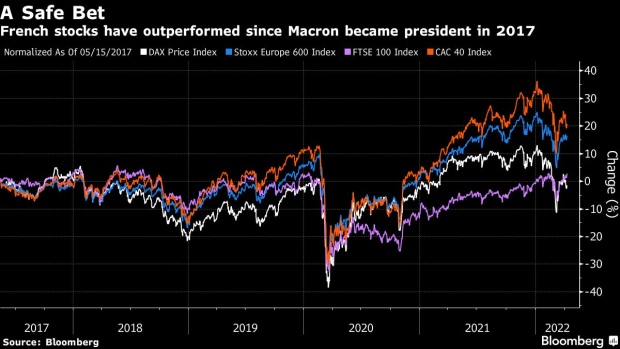Apr 10, 2022
Le Pen Risk Keeps Markets on Watch For French Election Results
, Bloomberg News

(Bloomberg) --
European investors shaken by the rising odds of a far-right victory in France’s presidential elections are on tenterhooks for the first-round results due later Sunday.
The euro, French stocks and even Italian bonds are among assets that have come under pressure as polls narrowed dramatically between President Emmanuel Macron and his main challenger Marine Le Pen. Bloomberg’s survey average from Friday showed Macron ahead by just 3.5 percentage points in the first round.
The election Sunday is expected to push Macron and Le Pen through to a second round on April 24, where each would look to build a broader coalition of voters in a one-on-one standoff. If preliminary results expected from around 8 p.m. in Paris suggest Le Pen is performing better than expected, the euro and the region’s equity futures could face further selling in Asia-Pacific trading hours.
“Should Macron underperform versus polls, there is room for more of an election risk premium to be priced into French assets,” said Aila Mihr, senior analyst at Danske Bank A/S. “Keep an eye out for voter turnout estimations released during the day. Lower participation, as suggested by the polls, could hurt Macron.”
Turnout by noon on Sunday in Paris was 25.5%, the interior ministry reported, about 3 points lower than it was at the same time in the presidential elections of 2012 and 2017.
A late surge by Le Pen, the National Rally candidate, has thrust French political risk onto the radar of markets once again. Things appeared to be going Macron’s way after Russia invaded Ukraine in late February, shifting the focus away from domestic politics and allowing the incumbent to cast himself as a safe pair of hands in turbulent times. Macron, 44, only began campaigning in earnest a little over a week ago.
How Far-Right Gains Make French Vote Harder to Call: QuickTake
But Le Pen, whose touring of towns and villages has focused on topics such as inflation, has got investors hedging for an upset. The 53-year-old nationalist has cast herself as the defender of the “little ones” against Macron’s reputation as the “president of the rich.” She pledged to slash gasoline prices and tax big energy companies.
French equities, including lenders BNP Paribas SA and Societe Generale SA, were hurt last week as polls showed Macron’s lead narrowing. Stocks have outperformed over the course of his tenure. While the first round Sunday almost certainly won’t yield an outright victor, it will shed light on just how much risk investors face.
A Stock Trader’s Guide to French Elections: Winners and Losers
The potential for a restoration of a wealth tax on financial assets, along with privatization of public broadcasting, highway nationalization and a cut to toll prices would likely hurt financials, media, luxury goods and infrastructure stocks, as well as companies with government stakes such as Electricite de France SA and Aeroports de Paris, Barclays Plc strategists said.
On the other hand, Le Pen’s pro-purchasing power plans could lift domestic consumer plays in the retail, food retail and leisure sectors, they said. The grocer Carrefour SA, viewed as a likely takeover target, could benefit.
Goldman Sachs Group Inc. strategists say the implications of a Le Pen victory would be bigger for Europe than for France alone, given Macron has looked to advance European integration. It could lift the risk premium for equities to imply a 7% price drop for the Stoxx Europe 600 index, strategists led by Peter Oppenheimer wrote in a note.
The Le Pen risk has already weighed on the euro, which slid 1.5% last week against the dollar to its lowest since the early stages of Russia’s invasion of Ukraine. Negative sentiment in the options market is close to levels seen before the 2017 French election, though that also reflects hedging over the war in Ukraine, inflation and monetary policy.
It’s also been driving measures of risk in the bond market. The difference in benchmark French and German yields has risen to the most since March 2020. The equivalent between Italian and German debt, a gauge of euro-area wide sentiment, is up almost 20 basis points this month to around 170 basis points, and the Goldman Sachs team sees it surging to between 180 and 210 basis points if she wins.
Threat of President Le Pen Sends French Bond Yields to 2015 High
Still, most investors aren’t as worried as back in 2017. On her third attempt to clinch France’s top job, Le Pen has sought to moderate her views to widen her base. She has abandoned the idea of Frexit, or a French exit of the European Union similar to the U.K.’s.
“None of the main candidates today want to directly exit the EU and this wasn’t the case five years ago,” said Gilles Guibout, Axa Investment Manager’s head of European equities. “There will be adjustments, whoever wins, but no massive changes in policy.”
For now, all traders can do is wait and hedge. Even if Le Pen were to win the presidency, legislature votes in June will determine how much of her agenda she can get through. A strong showing in both of these could see the euro slide below parity against the dollar for the first time in two decades, according to Nomura Holdings Inc. strategists, though that remains an extreme scenario.
“There is not yet ‘panic’ linked to the French elections, but we are certainly seeing increased vigilance on the part of investors, who must now integrate this electoral uncertainty into the geopolitical and monetary risks already present,” said Alexandre Baradez, chief market analyst at IG France. “A Le Pen win would be a shock for markets. It would be bad for business and hurt the image of France with foreign investors.”
©2022 Bloomberg L.P.






